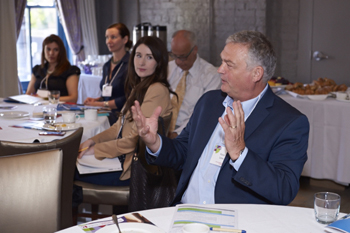

Alumni listen intently to keynote address by Annette Verschuren, CEO NRStor Inc.
More than 40 Faculty and grads of the Faculty of Environmental Studies (FES) and the Schulich School of Business gathered on May 28 to discuss the evolution and prevalence of entrepreneurship in the field of sustainability.

FES Dean Noël Sturgeon
In her welcoming remarks, Noël Sturgeon, FES dean, spoke about the importance of strengthening the pedagogy of the business and environment diploma program, and for FES to continue nurturing its entrepreneurial spirit through interdisciplinary and innovative approaches. Sturgeon stated that this was an important quality of a 21st-century learning community.
The Entrepreneurial Approaches to Sustainability: Strategies for Navigating a Changing Environment conference featured a keynote speech by CEO of NRStor Inc., Annette Verschuren, President and a presentation by Vice-Chancellor of Cape Breton University David Wheeler. Other distinguished participants included emcee Tyler Hamilton, the editor-in-chief of Corporate Knights and an FES Adjunct Faculty. The panellists included Master of Environmental Studies grads Melissa Peneycad (MES, '07), Steven Pacifico (MES '07), Sabrina Dias (MES, 05) and Dianne Zimmerman (MES, 02), all described the challenges associated with the balancing their personal ethics and careers.

Jose Etcheverry shares his excitement for the event and large-scale positive change underway
Following her welcoming address, Sturgeon introduced FES Professor Jose Etcheverry, co-director of the. Diploma in Business and the Environment offered through FES (also known as the Graduate Diploma in Business and Sustainability at the Schulich School of Business). Etcheverry shared his excitement for the event and spoke about large scale positive change underway that includes the new cap-and-trade system in the province of Ontario, which aims to limit emissions and fund climate mitigation solutions. He referred to the conference participants being part of the “tribe of sustainability” and described them as being the “can-do people, … [who] believe that the solutions are possible, and are part of the solution” in creating a sustainable global community.

Annette Verschuren delivers the morning keynote address
In her keynote address, Annette Verschuren offered an inspiring presentation through a personal narrative and crediting her father for instilling an appreciation of the importance of sustainability. She spoke about working on her family farm, her university studies, work in corporations and entrepreneurial ventures. Verschuren said that her advocacy for women in business and leadership is also rooted in her own experiences as a woman overcoming the hurdles of a male-dominated environment.
She painted a picture of her career journey working as a development officer with the Cape Breton Development Corporation, a coal mining operation, in Sydney, N.S., and then her role as executive vice-president at the Canada Development Investment Corporation, privatizing crown corporations. She explained her personal investment as the president and co-owner of Michaels of Canada (arts & crafts) from 1993 to 1996, which saw the company open 17 stores in Canada over 26 months. Finally, prior to starting NRStor Inc, she spoke enthusiastically about the innovative work she did as the president of The Home Depot in Canada and Asia, where she grew Canadian operations from 19 to 179 stores between 1996 and 2011.

FES adjunct faculty Peter Love poses a question to Annette Verschuren
When asked by a conference participant “What do you see as the challenge for businesses to drive sustainability?” Verschuren emphasized the importance of public policy, more outspoken leaders, and the role of education. She acknowledged that while many organizations have impressive sustainability projects, they don’t actively communicate their progress to stimulate public interest. She also highlighted employment statistics, indicating that there are more than 50,000 jobs in the clean tech sector in Canada. “When the environment and economy connect, that’s when innovations created,” she said. “When people have challenges, and they have problems solved, that’s where innovation is created. And so, we’re seeing it in spades across the country and across the world. And it’s just really so cool to be part of it.”

The FES Alumni Panel. Pictured, from left: Melissa Peneycad (MES, '07), Steven Pacifico (MES '07), Sabrina Dias (MES '05), Dianne Zimmerman (MES '02)
In the alumni panel discussion that followed the keynote address MES grad Melissa Peneycad said the “MES program is not for everyone, but if it’s the right program for you, then it’s unbelievable, it is life changing.” Through its interdisciplinary approach and flexibility, students in the MES program are able to study, explore and research anything they want. A common theme among the panellists was the challenge of balancing their careers with personal ethics.
“Balancing my personal ethics with the ethics of the corporation – which aren’t always in sync, is one of the reasons that I’m consulting independently,” said fellow grad Sabrina Dias. “Being able to translate what [the client] wants in terms of a business case – beyond green washing, beyond tokenism – into tangible sustainability strategies that will support their bottom line has been quite rewarding.”
The panellists also gave feedback about the MES program, and suggested more emphasis on pedagogy around entrepreneurship, and supporting students to carry out such innovative work.

David Wheeler, president and vice-chancellor of Cape Breton University, delivered the afternoon keynote address
David Wheeler closed the session by elaborating on the evolution of sustainability over the past 10 years from corporate approaches to entrepreneurial initiatives. “Sustainability occurs, when people entrepreneurially utilize resources,” said Wheeler, adding there are a variety of challenges associated with entrepreneurship and sustainability. He highlighted that a primary challenge is “achieving human development while maintaining ecological integrity.” Wheeler, notably developed the “Happen” brand at Cape Breton University, in which he and his colleagues inspire students to become innovative global leaders who advocate for change and inspire new ideas.
